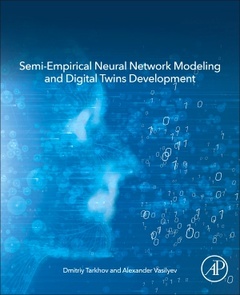Description
Semi-empirical Neural Network Modeling and Digital Twins Development
Authors: Tarkhov Dmitriy, Nikolayevich Vasilyev Alexander
Language: English
Subjects for Semi-empirical Neural Network Modeling and Digital Twins...:
146.54 €
In Print (Delivery period: 14 days).
Add to cart288 p. · 19x23.3 cm · Paperback
Description
/li>Contents
/li>Readership
/li>Biography
/li>Comment
/li>
Semi-empirical Neural Network Modeling presents a new approach on how to quickly construct an accurate, multilayered neural network solution of differential equations. Current neural network methods have significant disadvantages, including a lengthy learning process and single-layered neural networks built on the finite element method (FEM). The strength of the new method presented in this book is the automatic inclusion of task parameters in the final solution formula, which eliminates the need for repeated problem-solving. This is especially important for constructing individual models with unique features. The book illustrates key concepts through a large number of specific problems, both hypothetical models and practical interest.
1. Examples of problem statements and functionals2. The choice of the functional basis (set of bases)3. Methods for the selection of parameters and structure of the neura network model 4. Results of computational experiments 5. Methods for constructing multilayer semi-empirical models
Alexander Vasilyev was born in St. Petersburg (Leningrad) on 10 August 1948. After graduating mathematical school ?239 with a gold medal and the Physics Faculty of Leningrad State University (LSU) with honors, he defended the Ph.D. thesis: New boundary value problems for ultrahyperbolic
and wave equations, in the Leningrad branch of the Steklov Mathematical Institute in 1978.
Working since 1980 at the Department of higher mathematics of Peter the Great St. Petersburg Polytechnic University as an Associate Professor and since 2007 as a Professor, he read advanced courses and electives in various areas of modern mathematics, led seminars.He prepared and in 2011 defended his doctoral thesis: Mathematical modeling of systems with distributed parameters based on neural network technique, for the degree of Doctor of Technical Sciences in the specialty 05.13.18 – “Mathematical modeling, numerical methods, and software. Professor Vasilyev’s scientific interests are
- Offers a new approach to neural networks using a unified simulation model at all stages of design and operation
- Illustrates this new approach with numerous concrete examples throughout the book
- Presents the methodology in separate and clearly-defined stages



